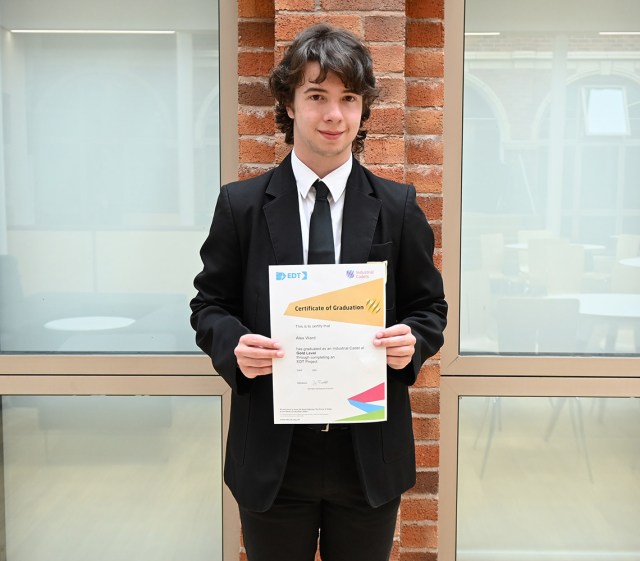Students impress in Industrial Cadets Scheme

Six Lower Sixth students utilised their problem solving and engineering skills as they took part in this year’s Industrial Cadets Gold Project.
The team, which was led by Alex Ward and consisted of Jessica Barraclough, Joseph Hadfield, Daniel Atanasov, Rafe Howgate and Nicholas Houghton, tackled a challenge set by Network Rail – namely “Light and power supply monitoring in low voltage distribution cubicles”.
Low voltage distribution cubicles operate at 230v and are positioned trackside and, at the moment, there is no remote means of determining when power is interrupted.
An initial problem was to supply automatic lighting when the cubicle was opened for maintenance or repair and, after an extended investigation of the problems presented, the team homed in on a simple Raspberry Pi controlled monitoring system using a PIR detector to switch a light source when the cubicle door was opened.

A rechargeable power supply was programmed to detect interruption to the power supply and then send an SMS message to a monitoring station responsible for the cubicle.
Each of the team members contributed sections towards an industry standard report on the project and they worked with Tony Finlinson, a Senior Project Engineer with Capital Delivery Eastern, Network Rail who encouraged them to explore the scope of the issue and the wide range of possible solutions.

The Industry Assessor praised the group’s “enthusiasm”, “project management skills” and “well-rehearsed presentation” with the team’s collective effort and strong leadership also winning rave reviews.
They noted the students’ hard work and research “paid off with the great solution to the problem”, they enjoyed the demonstration of the model in action and commended the report for “being beyond the expectation of the assessors”.
The Industrial Cadets scheme operates under the EDT – the Engineering Development Trust. In previous years, SGS took part in the EES (Engineering Education Scheme) which operated with face-to-face meetings and had a residential workshop based in a local linked university. This year’s version was much changed due to Covid restrictions but the students applied themselves with exceptional commitment.

In the past, students have worked with companies in the aerospace and waste water treatment sectors to name but a few and they have come up with solutions which have been adopted by the companies they have worked with.
Participation in the scheme has been extremely beneficial for students in gaining places at the universities of their choice and onto the course they were aiming for and helps build their confidence and presentation skills.








